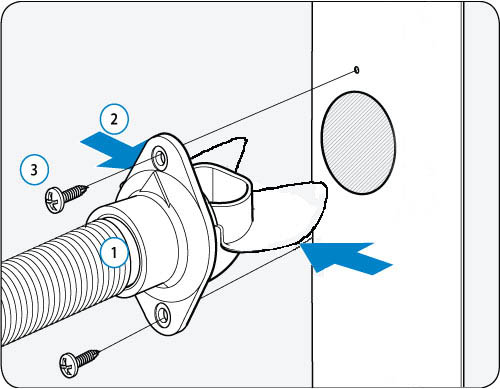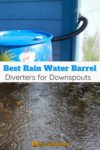Downspout diverters make it incredibly simple to get started with rainwater harvesting.
This guide will go over what you need to know about how downspout diverters work, the different types of diverters, when filters are necessary, how to install, and the best downspout diverters for rainwater harvesting.
Best Rain Barrel Diverters for Rainwater Harvesting
Earthminded Flexifit Downspout Diverter
The Flexifit downspout diverter by Earthminded is one of the most popular. The reason for this is that it’s the easiest to install.
All you need to do is drill a round hole in your downspout. Because the diverter is made of flexible material, it easily fits into the hole. You then screw it in place and connect it to your rain barrel hoses.
The diverter catches water along the outside of the downspout but still allows water to pass through. This means you won’t need an overflow outlet on your rain barrel.
However, the diverter does narrow the size of your downspout, potentially causing clogs. Make sure you put some screen leaf catchers over your downspouts. Also, regularly remove the Flexifit diverter to check for clogs.
If you only need the diverter and winterizing cap, you can buy it as a universal diverter for rectangular or round downspouts. They also have an affordable kit that includes the diverter, hole saws, spigots, and hoses.
Pros
Incredibly easy installation
Fits all residential downspouts
Kits include everything needed for installation
Easy to remove for cleaning
Doesn’t leak
Good overflow protection
Cons
No filter
Oatey Mystic Rainwater Downspout Diverter
The Oatey Mystic is a two-piece PVC rainwater diverter. To install, you need to cut a section of your downspouts and insert the diverter. Then, connect the hose to the outlet and your rain barrel’s inlet.
The interior of the Mystic diverter is relatively large, so it isn’t likely to clog even if you have dirty gutters. However, it’s not as good at collecting rainwater as some diverters, especially in light rains.
While the Mystic doesn’t have a filter and only has one hose outlet, it does have a good design: the bottom of the diverter sits inside the downspout, meaning that leaks won’t occur like with some other diverters.
Note that the winterizing stopper is flimsy. You’ll probably need to replace it with one made of more robust rubber.
Pros
Good design
Holds up well even in very cold winters
Fairly easy to install
Cons
Won’t fit 3×4 or round downspouts
Only has one hose outlet
Short hose
Winterizing stopper is flimsy and will need to be replaced
Downspout Diverter with Filter Basket (2×3″)
This downspout diverter is sold under many different brand names. Its main feature is that it has a built-in filter basket. Because you annoyingly have to disconnect the diverter to access the filter, you probably won’t empty the filter often.
However, the diverter does have one other nice feature: its outlet is a standard garden hose connection. This is great if your rain barrels are far from the downspout.
Unfortunately, the diverter sits over the downspout rather than inside it, meaning leaks can occur. Still, it works well and is a good pick if you don’t want to bother adding a hose adapter to an outlet.
Pros
Has filter
Garden hose compatible
Very cheap
Cons
Filter basket is annoying to access
May leak a bit
Save the Rain Metal Diverter
This is a very simple rainwater diverter. When the 7-inch arm is open, it channels water outwards towards a rain barrel with a large opening. To stop diverting water, close the arm.
For its type, it does exactly what it is supposed to do. However, as you’d expect with this type of downspout diverter, water splashes all over the place. It’s also hard to control where the water will land.
It isn’t recommended if you are worried about damaging your home’s foundation.
Pros
Very simple design
Diverts all water in downspout
Easy to open and close
Cons
Hard to control water flow
Can’t connect to a hose
Lots of splashing
Aquabarrel Y Downspout Diverter
This is a Y-type downspout diverter that has a switch in the middle. You can set the switch so all the water goes to the left or right. When the switch is in the middle, half of the water will flow to each side.
While the design means no overflow protection, it gives you a lot of flexibility with how you set up your rain barrel system. The diverter is made of metal, so it is durable, and you won’t have to worry about it withstanding harsh winters.
Pros
Made of durable metal
2×3 and 3×4 sizes
Available in many colors
Lever allows you to divert water left or right
Cons
No features like overflow protection or a filter
How Do Rain Barrel Diverters Work?
Downspout diverters attach to your downspouts. They have switches or funnels which allow some or all of the water flowing through the downspout to go through a separate exit instead. The exit (such as a hose) is connected to your rainwater barrels.
You do not need to use a downspout diverter for rainwater harvesting if you set up your system, so the gutter empties directly into the rain barrel. However, there are many benefits to using a downspout diverter.
Benefits of Using a Downspout Diverter
Closed system:
Hose-type downspout diverters create a closed system: the hose is connected directly to the barrel, and there’s no need for an overflow port. This means there are fewer places for mosquitoes and other pests to enter your barrels and fewer places for leaks.
*Note that not all types of downspout diverters create a closed system.
Overflow protection:
Most downspout diverters have overflow protection: when the rain barrel is full, the rainwater will fall through the main gutter. This ensures that the barrels don’t overflow and damage your home’s foundation.
Without a downspout diverter, you need an overflow port on your rain barrels. Unfortunately, sizing overflow ports can be tricky. During heavy storms, the water might not be able to exit the port fast enough and can cause the barrel to overflow and damage your property.
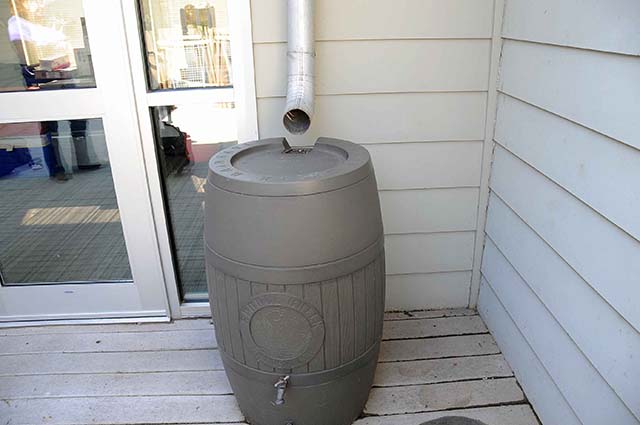
Debris continues to flow through downspout:
Downspout diverters do not entirely block off the downspouts, so debris from your gutters can still pass through. This helps keep debris out of your rain barrels, so they stay clean.
Cons of Downspout Diverters
Because downspout diverters allow much of the rain to flow down the middle, they are very inefficient. However, this usually isn’t an issue for people with small rainwater harvesting systems.
Even if the diverter only catches 20% of the rain, it will still be able to fill up a 55-gallon barrel during a 1″ shower (see our rainwater harvesting calculator here).
However, inefficiency can be a significant issue if you must harvest large amounts of water and live somewhere with infrequent rains. You’ll probably be better off setting up a system where the gutters flow directly into the rain barrels.
Types of Downspout Diverters
Hose Diverters
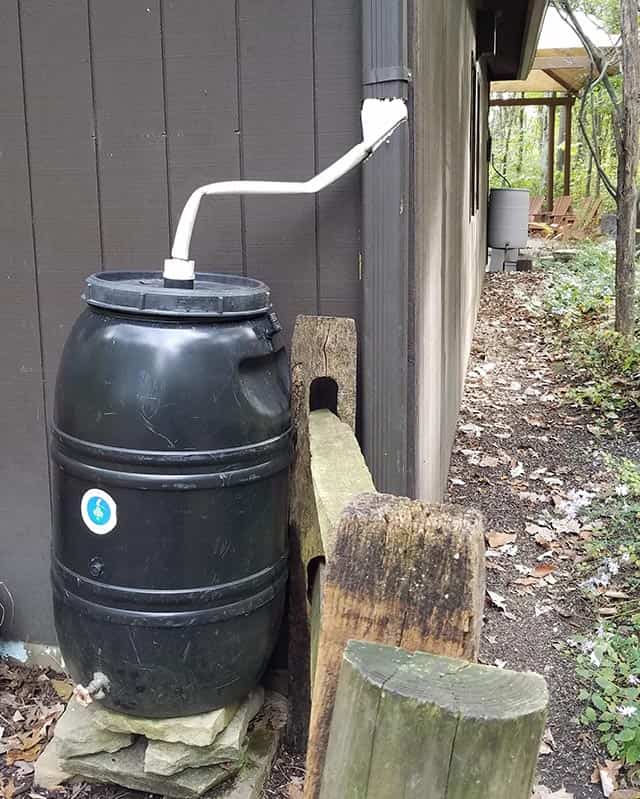
These are the most popular type of downspout diverters. They have a partial funnel inside of them. The funnel catches water through the downspout and channels it through a hose into your rainwater barrels.
Because the funnel doesn’t completely block the downspout, debris can still flow through.
It also allows for a completely closed system: once the rain barrel is full, the water will back up into the hose and drain back into the downspout. You won’t need an exit port on your rain barrels.
3-Way Wintering Tee Diverter
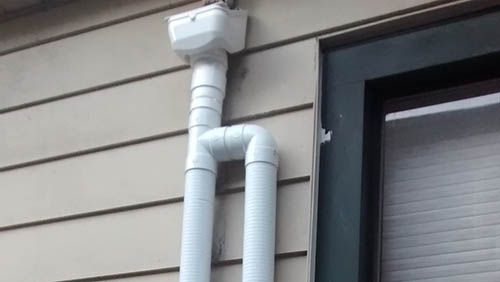
This is a very basic way to set up a rainwater harvesting system. You replace one section of pipe with a 3-way tee (usually made out of PVC).
The tee has a plunger used to close off one of the outlets. The plunger can be set, so all water from your gutters goes directly into your rainwater barrels. In winter, the flap is closed, so no water enters your rainwater harvesting system. Some wintering tees have built-in filters.
Y-Shaped Diverters
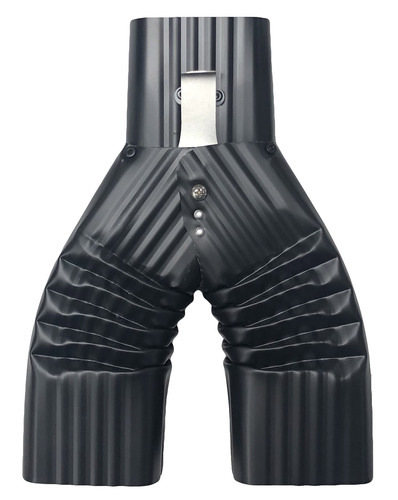
Y-shaped rainwater diverters are almost always made out of metal and thus are more durable. There is usually a switch in the Y, which allows you to choose which direction the rainwater will flow through the diverter.
This gives you more flexibility when setting up your system. For example, you can close the switch when your rain barrel is full. Or you can put the switch in the middle setting and have it divert water to two barrels.
Y-shaped diverters aren’t great options for many homes, though. There is no overflow protection. They don’t keep debris out of the barrels, which could result in clogs and overflow. They are also very bulky and trickier to install than most hose diverters.
Arm-Type Diverters
Arm rainwater diverters (like the one by Save the Rain) are a piece of downspout with a flap that you can open and close. When open, some of the rainwater flows out.
There is no hose connection, so you must carefully position the rain barrel underneath it. You’ll need a very large inlet hole to catch the water as it flows out.
Even with a large inlet, you can still expect a lot of splashing. This makes arm-type diverters very inefficient, as much water goes down the main gutter or is lost to splashing.
You also need to have an overflow port on your barrels, another area where mosquitoes could enter.
First Flush Diverters
With first flush diverters, the rainwater first flows into a vertical section of pipe. A ball in the pipe rises as the pipe fills and blocks it off. Once blocked, the rest of the rainwater flows through a horizontal section of pipe and out to your rain barrels.
First flush diverters are often recommended where it infrequently rains because the roof can get very dirty between rains. When it rains, the rainwater that goes through the downspout can get very dirty and then get cleaner. A first flush diverter keeps this dirty water from making it to your rain barrels.
Despite this, first-flush diverters usually aren’t recommended. They have to be cleaned very regularly. If not maintained, they can cause clogs and other failures in your system.
Should Your Downspout Diverter Have a Filter?
You’ll probably want to get a diverter with a filter if:
You don’t have gutter screens or guards
There are lots of trees overhanging your roof
It rains infrequently where you live
You are capturing large amounts of rainwater which may remain stagnant for long periods of time
You will use rainwater for showering, hand-washing or drinking
How to Install Downspout Diverters for Rainwater Harvesting
Each downspout diverter is a bit different. However, these are the general instructions you can expect. You’ll need a hole saw or a hack saw.
- Determine where you want your rainwater barrels to be
- Set the barrel on a sturdy, level platform
- Mark where the diverter will go on the downspout. It usually needs to be level with or slightly above the barrel inlet.
- Using a saw, cut out a section of the downspout.
- Insert the diverter into the downspout.
- Connect the hose to the diverter and attach it to the rain barrel.
The image below shows how to install the Earthminded Flexifit downspout diverter.
